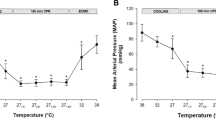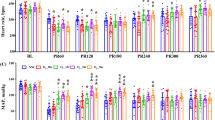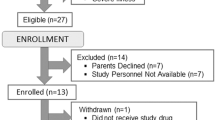Abstract
WE have shown previously that if rats were cooled to cardiac arrest without assisted ventilation, held thus for 30 min, and rewarmed with artificial ventilation, only 9 per cent of them recovered1,2. This incidence could be increased to 45 per cent if their abdomens were pumped before rewarming3,4. In these experiments, if the abdominal pumping had failed to restart the heart, spontaneous respiration did not subsequently recover. We now report new measures which further increased the incidence both of the hearts restarting and the recovery of spontaneous respiration.
This is a preview of subscription content, access via your institution
Access options
Subscribe to this journal
Receive 51 print issues and online access
$199.00 per year
only $3.90 per issue
Buy this article
- Purchase on Springer Link
- Instant access to full article PDF
Prices may be subject to local taxes which are calculated during checkout
Similar content being viewed by others
References
Hillman, H., and Rogers, P., J. Physiol., 204, 87 (1969).
Niazi, S. A., and Lewis, F. J., Surgery, 36, 25 (1954).
Rogers, P., and Hillman, H., J. Appl. Physiol., 29, 58 (1970).
Rogers, P., J. Physiol., 207, 19 (1970).
Author information
Authors and Affiliations
Rights and permissions
About this article
Cite this article
ROGERS, P., HILLMAN, H. Increased Recovery of Anaesthetized Hypothermic Rats induced by Intracarotid Infusion. Nature 228, 1314–1315 (1970). https://doi.org/10.1038/2281314b0
Received:
Revised:
Issue Date:
DOI: https://doi.org/10.1038/2281314b0
Comments
By submitting a comment you agree to abide by our Terms and Community Guidelines. If you find something abusive or that does not comply with our terms or guidelines please flag it as inappropriate.



